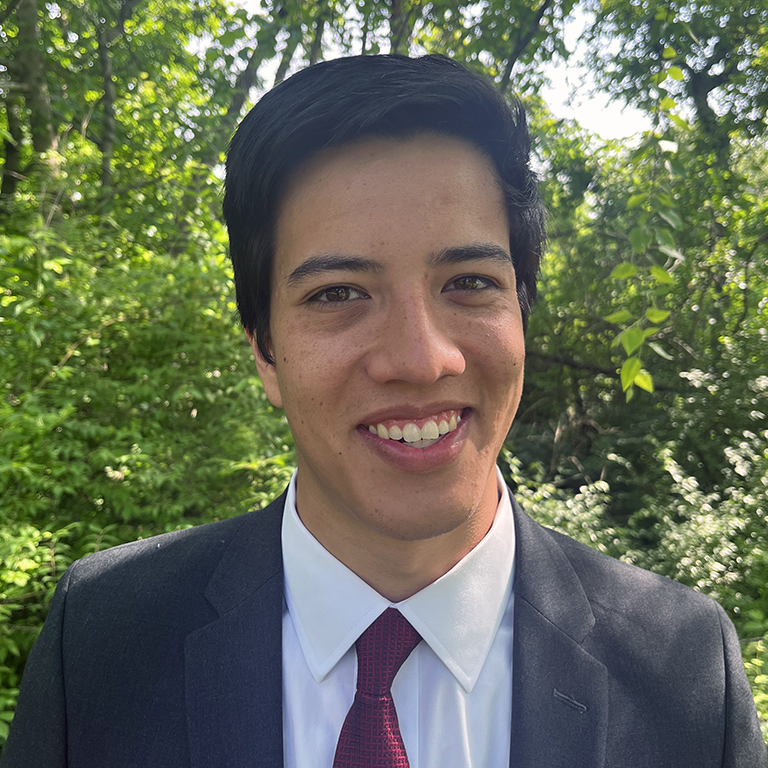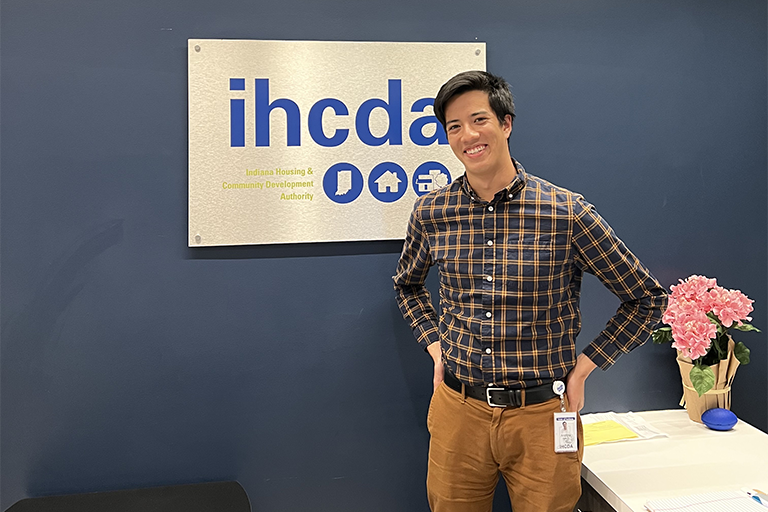This Q&A series highlights McKinney Climate Fellows alumni and their professional journeys within Indiana and beyond. The McKinney Climate Fellows program, administered by Indiana University’s Environmental Resilience Institute and Integrated Program in the Environment, connects IU undergraduate and graduate students interested in climate, sustainability, and community resilience with career experiences.
Thinking broadly about how various sectors can reduce their contributions to climate change has led to rewarding opportunities for Andrew Walters, who graduated with an MPA from the IU O’Neill School of Environmental and Public Affairs in 2023.
As a McKinney Climate Fellow in 2022, Walters helped a major Indiana utility transition its vehicle fleet to electric and biofuel vehicles through Greater Indiana Clean Cities, an Indianapolis-based nonprofit focused on facilitating the adoption of alternative fuels. The experience gave him the opportunity to develop new skills that he employs in his current role helping Hoosiers keep their lights on and avoid utility disconnection.
The following interview has been lightly edited for length and clarity.
What year did you participate in the McKinney Climate Fellowship and where was your placement?
I participated in the McKinney Climate Fellowship during the summer of 2022 as a fellow at the Greater Indiana Clean Cities, Inc. I was based in Indianapolis, IN and worked remotely from Bloomington.
What major project did you work on during your McKinney Climate Fellows placement?
I worked on a multitude of projects, including partnering with a major utility in Indiana to transition their internal vehicle fleet from traditional internal combustion engines to electric vehicles and biofuels. We worked to complete a fleet analysis that reviewed how many miles were driven in the different vehicles, what type of vehicles they owned, how they used those vehicles, and how we could assist them in making them more climate friendly.
I learned a lot about biofuels, including biodiesel, and how they can be a useful intermediary step on the path to transitioning to electric vehicles. That process was both surprising and interesting as I was unaware of what options were available to help utilities and other organizations transition.
Throughout the fellowship, were there any skills you learned that you use in your current work?
I learned several useful skills during my time in the fellowship, including how to leverage Excel for analysis and how to manage federal grants. The grant writing was an instrumental skill that I was grateful to have the opportunity to learn as it has helped prepare me for my current role.
The team also conducted a significant amount of engagement and outreach, including sharing opportunities for training and organizing vehicle showcases that outlined options for those looking to transition. These skills serve me well as I engage with stakeholders in my current position.
What is your current position and what responsibilities does your job include?
I am the energy assistance program policy and engagement analyst at the Indiana Housing and Community Development Authority (IHCDA). The IHCDA is a quasi-governmental agency within the Indiana state government. In my position, I help lead the Energy Assistance Program, which is known at the federal level as the Low-Income Home Energy Assistance Program (LiHEAP). This program is a block grant that is distributed to the fifty states, territories, and tribal nations and is designed to help people with their utility bills, particularly those who are behind on their bills and are nearing disconnection.
In my role, I help decipher how the state will allocate the funding and implement policy to operate the program in partnership with local service providers, nonprofits, and other stakeholders.




